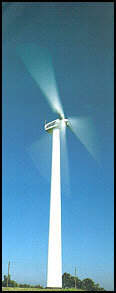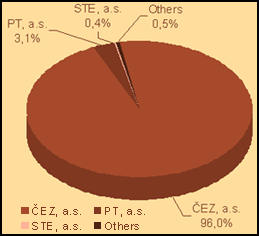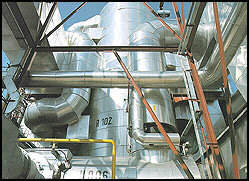 Energy Energy |

The energy, gas and heat production and distribution is always one of the most lucrative sectors in any economy, especially if the market is protected against new entrants. Therefore, the Czech Republic has been a focus of many investors, waiting for the privatization of the Czech energy producer CEZ, monopoly natural gas importer Transgas, pipelines operators Cepro (operating intracountry pipelines) and Mero (running two international pipelines, Druzba from Russia and Ingolstadt from Germany), as well as the triple eight of regional energy, gas, and heat distributors. All the postcommunist governments have stressed that price liberalization should come before the privatization of the regional utilities, and only after the distributors are private, the national energy distributor CEZ should be put on sale. Transgas, the importer of natural gas, was to remain state-owned under most privatization plans at least in medium-term, as well as the pipeline operators that are considered strategic companies and that are to remain state-owned at least until 2002.
The original fast plan for energy price deregulation was slowed considerably in mid-90's for pre-election political concerns of the ruling right-wing parties, putting on hold also the privatization of utilities. Foreign investors, that have repeatedly been put off, have moved into a somewhat unusual strategy. Municipalities in the given region have been given untradeable shares in regional distributors from the state. But while the shares themselves have not been tradeable, voting rights were - and foreign investors started buying them from cash-starved municipalities, together with the stakes available at the stock market, often amassing almost-majority stakes in the utility distributors (and in a few cases even taking control of the company).
However, it creates a serious uncertainty both among interested investors and utility companies. There are some bodies that have expressed interest (by buying up stakes in the companies) in acquiring the utilities but the final privatization method will in most cases depend on the government's decision. "Theoretically, it might enable somebody completely new to take part of our shares and win the competition," points out Frantisek Sucha, chairman of the board and managing director of Zapadoceska energetika, western Bohemian energy distributor, adding that such uncertainty seriously limits the commitment of those foreign partners that already own stakes in the utilities and that have been promised to be considered as the first choice for the government-owned shares.

The need for new investment - and thus for bringing in new partners - is very high in the energy sector. "While prices for electricity in general are low in the Czech Republic in comparison with western European prices, the costs of technology are on the same level as in western Europe," points out Drahomir Ruta, managing director of Prazska energeticka, the electricity distributor in the Czech capital of Prague. "However, we also invest heavily into customer service, not only by using a new billing system but also by adding new customer centers throughout Prague and by establishing a call center that can take care of our customers' problems," Ruta adds.
Among the energy distributors, Severoceska
energetika (operating in the Northern Bohemian
region) is probably the most innovative and independent,
working intensively on the company renovation and
restructuring. To prepare for energy market liberalization,
Severoceska energetika has managed in the end of
last year to connect its network with the German
energy network that will enable Severoceska energetika
to buy cheaper energy in Germany as soon as the
market is open rather than buying from the dominant
Czech producer, CEZ. Severoceska energetika had
to strongly focus on restructuring, as it operates
in a region dominated by coal mines and chemical
industry, two areas undergoing painful restructuring.
"Therefore, we are looking intensively into heating
industry, cogeneration of energy and heat, possibly
into energy producing and of course telecommunications,"
says managing director of Severoceska energetika
Jiri Stastny. |
Heating is apparently interesting for gas distributors as well. "We are trying to find customers who are looking for heating rather than simple gas supply," says Libor Martinek, chairman of the board and managing director of Jihomoravska Plynarenska, regional gas distributor in southern Bohemia. Moreover, he stresses the need for companies so far protected by monopoly to diversify their services and prepare for new opportunities from selling gas to automobile industry or gas meter services to consulting service, even more so since the acceptance of the European Union legislation will mean certain separation between trade activities and distribution. "Utility distributors will have to work very hard to be competitive in the new environment," says Martinek.

As has been the case in the past in western Europe, Czech energy companies will have to meet strict environmental protection standards. CEZ has been upgrading its power plants since early 90's and further cleaning of the air was helped by increasing consumption of natural gas. "In 1990, natural gas represented about 11% of total energy consumption in this country while today the number is about 20%," says Tomas Tichy, CEO of Transgas. If environmental pressures increase, the Czech Republic may see a development similar to Eastern Germany. Both countries were largely dependent on coal, especially lignite. "In Eastern Germany, you can see how natural gas is pushing out the lignite and taking its place in heat generation. Moreover, the growing usage of natural gas should attract interest of international investors as there is potential for various gas uses and an untapped market. This development will also undoubtedly make Transgas more appealing to investors once they are invited to enter the company. Transgas has been posting very good economic results several years in row despite price regulation of natural gas and should thus be ready to compete once the regulation is lifted. The largest profit for Transgas comes from transport of Russian natural gas to southern and western Europe. For Czech consumption, Transgas has diversified natural gas sources and while Russian-produced natural gas remains the main source, roughly 25% of consumption is covered by Norwegian producers through newly built pipeline.
Mero CR, the operator of the two international oil pipelines (Druzba from Russia and Ingolstadt from Germany), will be another interesting investment opportunity once it is put up for sale. Not only that the company is diversifying its revenue sources by becoming a player in telecoms (see the Telecommunications chapter) but it also strongly focuses on building up its potential. While it currently uses both pipelines to import oil into the Czech Republic (utilizing its capacity to only about 30%), Vaclav Franc, managing director of Mero says he would like to reverse the flow of the Czech-German Ingolstadt oil pipeline to transport cheaper Russian oil into Germany.
"We should implement this project because it would bring the Czech Republic much more money, since transport fees are more lucrative than selling on the Czech market," explains Franc, adding that he would like to see the project implemented in 2001 or 2002. And apparently, there would be room for a strategic investor, as Mero will have to invest into new equipment, controlling communications system and build 15 kilometers of new pipeline that should terminate on the German end in the Esso refinery near Ingolstadt. |

